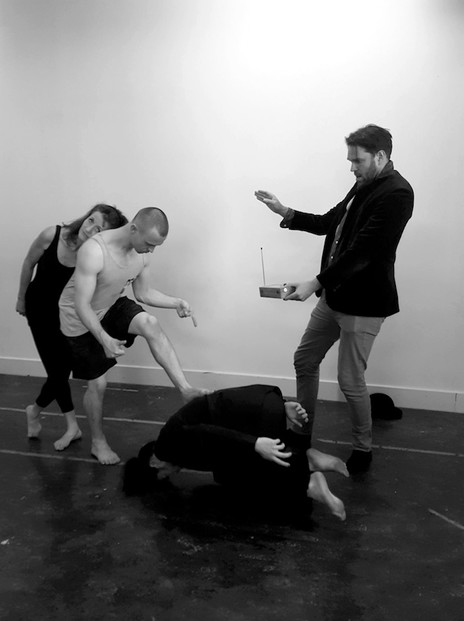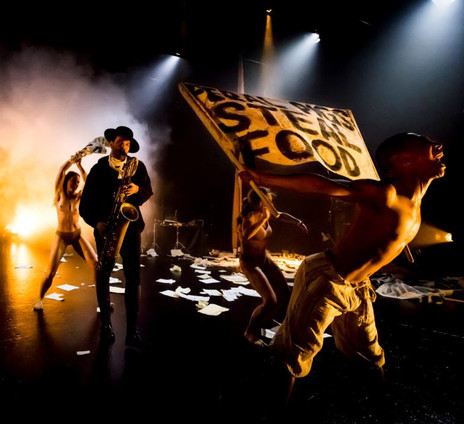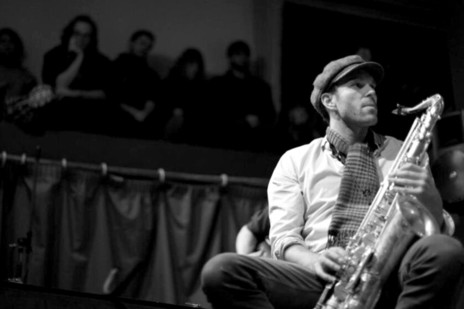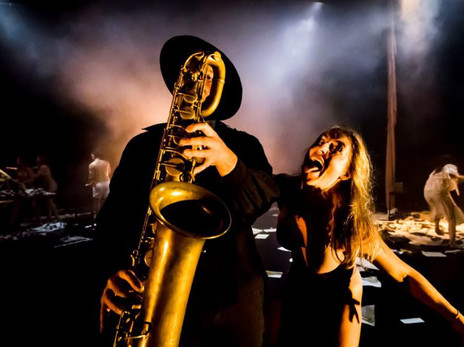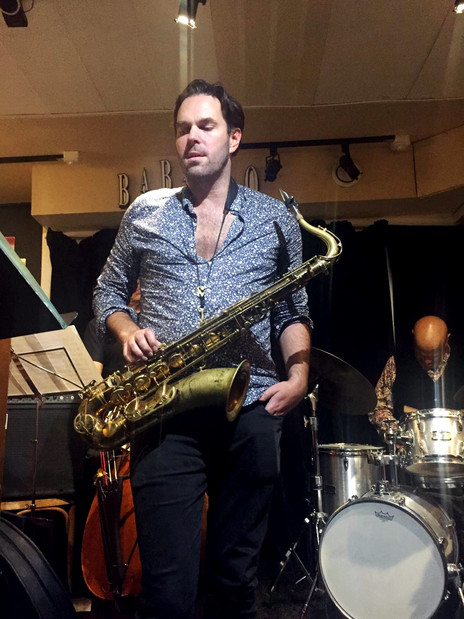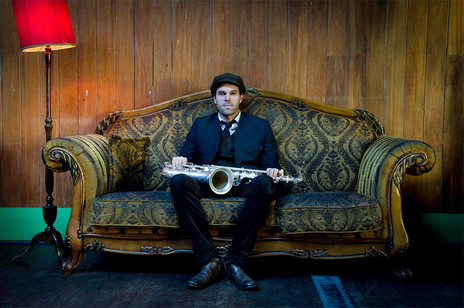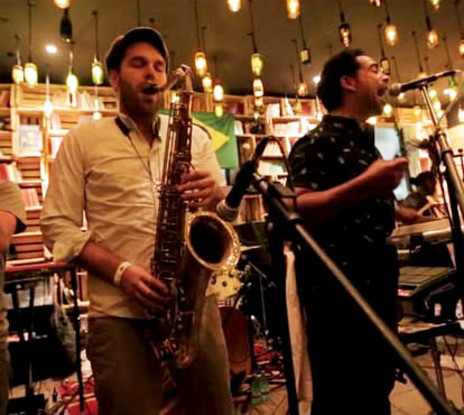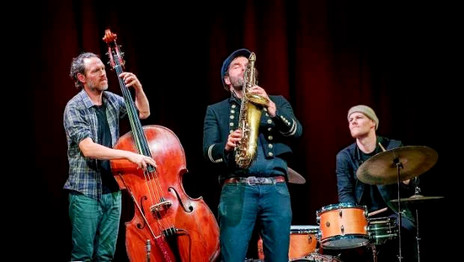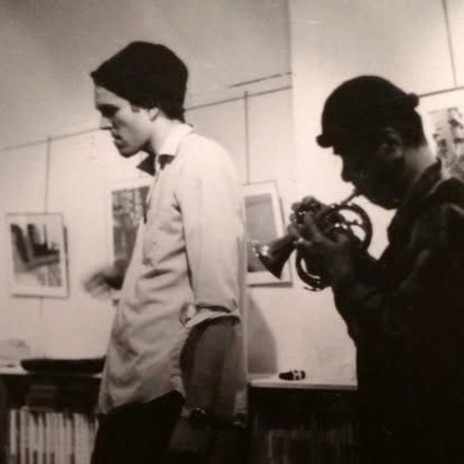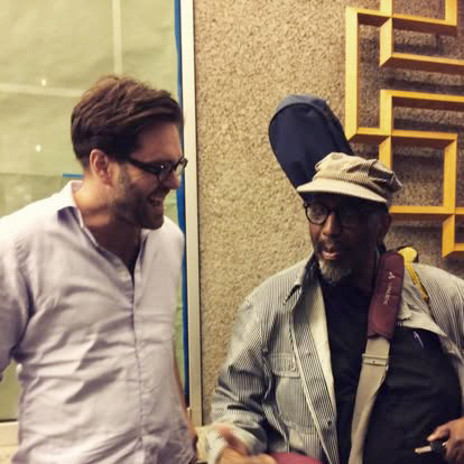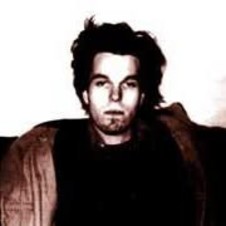The son of the New Zealand poet Louis Johnson and a school teacher, Lucien Johnson grew up outside of Wellington in Pukerua Bay, a small seaside suburb at the southern end of the Kāpiti Coast. At the time, his family was firmly ensconced within an artistic community that included writer Alistair Campbell and composer Jenny McLeod. Although not quite serving as a piano teacher, McLeod showed him different swing, ragtime, and jazz feels after he began tinkling the ivories at age six. A year later, in 1988, his father passed away.
A child of the early 1980s, Johnson progressed through the classical piano grade system before taking up the saxophone at Wellington College. At age 14 he read the great American Beat Generation author Jack Kerouac’s defining work, On the Road. Despite having a musical upbringing, Johnson really credits Kerouac’s electrifying descriptions of post-war American jazz and the culture that surrounded it with igniting his interest in the tradition. Inspired, he purchased a John Coltrane compilation and began building his own jazz collection.
As a high school student Johnson began taking extracurricular music classes with the Scottish saxophonist Pete France, who encouraged his interests. “He was brilliant, and it escalated from there,” Johnson says, laughing. “By sixth form [year 12, I was saying, this is what I want to do. I want to go to jazz school.”
In 1998, he enrolled at Massey University (then Wellington Polytechnic) in a Bachelor of Music, majoring in jazz. In his first year, Johnson reconnected with an old friend from primary school, the bassist Tom Callwood. They formed a trio with the drummer Chris O’Connor. “I was pretty industrious,” Johnson says, recalling the era when he spent up to eight hours a day practising while flatting in Mt. Victoria.
Johnson had a pivotal experience while he was attending the Wellington Jazz Festival. He recalls Ornette Coleman’s album The Shape of Jazz to Come playing as pre-show music at an event. “‘Lonely Woman’ came on,” he remembers. “That blew my mind and really opened me up to free jazz.” In the wake of that watershed moment, he began spending time at The Space in Newtown, an experimental music venue that improviser and multi-instrumentalist Jeff Henderson ran from 1999 to 2003.
he began spending time at The Space in Newtown, Wellington’s experimental music venue
By his third year at jazz school, Johnson had befriended most of the key musicians active in Wellington at the time. Whether it was a covers gig, originals or a private function, if he could get on stage, he was there. Thinking back to the early 2000s, he remembered filling in for the saxophonist Scott Towers on Sundays at The Lido cafe, and playing a regular gig at Deluxe Cafe with his then-flatmate, Fat Freddy’s Drop trumpet player Toby Laing and Bret McKenzie (of Flight of the Conchords). “Me, Toby and Bret put together a band called The Shrinks, where we played tiny instruments at bars like The Matterhorn,” he says.
A new generation of Wellington bands like Trinity Roots, The Black Seeds and Fat Freddy’s Drop were building a loyal following by playing regularly throughout the capital. Johnson was adjacent to this burgeoning movement, but he remained deeply focused on playing jazz. “There were two people who were really significant for me around that time,” he elaborates. “One of them was [the pianist and composer] Jonathan Crayford, the other was [the drummer] Anthony Donaldson.” Between 2000 and 2002, he spent most evenings playing with those two musicians or hanging out at Donaldson’s inner-city studio space.
Although he didn’t feel like this at the time, in retrospect, Johnson realises that those years were a golden age for live music in the capital. Living in Wellington was cheap, and the opportunities to gig were abundant. “Rent was $70,” he says. “The student allowance was $210. You could actually live on that, you know?” During these years, he made some of his first recordings, playing on records helmed by the musicians Matthew Mitchell and Norman Meehan. Although the plentiful realities were staring him in the face, he couldn’t see them. “I couldn’t wait to get out of New Zealand by that point,” he says.
In 2003, Johnson boarded a flight from Wellington to Paris. Before he left, he had a conversation with Donaldson that proved auspicious. “At the time, I was really into the [US jazz composer and] saxophonist Steve Lacy,” he recalls. “Steve was living in Paris. I thought that if I moved there, I’d be able to study with him. I also knew that [US drummer] Sunny Murray and [US double bassist] Alan Silva were living there as well. I told Anthony [Donaldson] that I wanted to start a trio with them.”
In 2003, Johnson boarded a flight from Wellington to Paris
Within his first week in Paris, Johnson spotted an advertisement for a Sunny Murray performance on the outskirts of the French capital. On arrival, he found himself inside a jazz club located in the basement of a residential property. Although he didn’t connect with Murray, he struck up a conversation with his American bassist, Farris Smith Jr. Once they started playing together, Smith Jr. introduced Johnson to Murray, who entertained him with wild tales of touring through Morocco and gigging with a group of belly dancers.
Smith Jr. also introduced him to Makoto Sato, a Japanese drummer who moved to France in the 1970s and became a key figure in the contemporary improvised music scene. As Smith Jr. began to fade out of their circuit, Sato introduced Johnson to Silva, and they started playing together as a trio. Things might not have worked out with Murray, but this version of Johnson’s prescient vision was close enough.
Over the next few years, Johnson got stuck into the local jazz scene. However, his experience was less Ernest Hemingway and more George Orwell’s Down and Out in Paris and London. “It was pretty tricky,” he says. “It was a very different scene from what I expected. I sort of imagined that what was going on in Wellington was going on everywhere, on a bigger scale, and it wasn't.” Regardless, between €50 gigs and stints spent teaching English and saxophone, he made it work. Having a British passport through his mother also helped.
Another sign Johnson was moving in the right direction came when his fledgling piano composition ‘To the Sea’ was premiered by the New Zealand-born pianist Jeffrey Grice at Salle Gaveau in Paris, before being performed on tour across Europe and New Zealand. “He asked me to write something for his concert after he heard me doing an improvised music gig,” Johnson says. “We had a mutual connection in Jenny McLeod.”
Things really got rolling for Johnson after he started dating a French woman who worked in theatre. As a result, he was able to start composing and performing music for theatre shows. He even had the opportunity to tour across India with Clown Sans Frontières, an arts organisation that provides entertainment in the wake of humanitarian crises.
Johnson was asked to compose the music for a play about the poet Edgar Allan Poe
In 2007, Johnson flew back to Wellington to complete his previously unfinished Graduate Diploma in Music at Victoria University. While he was home, the lecturer and artist John Downie asked him to compose the music for a play he’d written about the American poet Edgar Allan Poe. Although the play was never completed, the music became a cabaret show titled The Night’s Plutonian Shore. We’ll come back to that later on.
After finishing his Graduate Diploma in Music, Johnson returned to Paris and recommenced his involvement in the jazz and theatre scenes. In 2009, Johnson and his partner at the time travelled to the Caribbean to take part in a series of theatre and music workshops in Port-au-Prince, Haiti. A few months later, they returned to help mount a theatrical adaptation of George Orwell’s Animal Farm. Johnson wrote the music, which incorporated voodoo drumming and references to Haitian history. “That situation was like a dream, but it was very difficult,” he admits, citing political tensions that were boiling in the country at the time. “It’s hard to talk about the experience or say why, but it was very valuable.”
That same year, the New Zealand filmmaker and jazz musician Geoff Murphy released Tales of Mystery & Imagination, a film inspired by Edgar Allan Poe’s posthumous compendium of the same name. Having seen a performance of The Night’s Plutonian Shore, he approached Johnson about using his compositions as the soundtrack.
In 2010, Johnson again returned to Wellington, but this time on a more permanent basis. In the wake of the January 12 Haiti earthquake, he formed the 11-piece Shogun Orchestra ensemble to play a fundraising show for Haiti at the San Fran venue on Cuba Street. Serving up a South Pacific twist on funk, calypso, afrobeat, highlife, and Ethio-jazz, the group quickly proved to be too good to be a one-off. That year, they recorded a self-titled album for release through the boutique Wellington music company, Economy Records, paving the way for performances at Womad and the Wellington Jazz Festival, as well as a European re-release through Berlin’s Jakarta Records.
Over the next few years, Johnson also recorded and performed with The Troubles, The Yoots, Wild Bill Ricketts, Hollie Smith, Lord Echo, Natalia Mann and The Phoenix Foundation. Between sessions and gigs, he also worked on a Master of Music in Composition Thesis at the New Zealand School of Music, titled The Way of Steve Lacy: Finding Individuality through Musical Genealogy (2012). “That was all a really beautiful time,” he says. “We were very collaborative and we’d record albums over a weekend, or sometimes just a one-nighter at Fat Freddy’s Drop’s studio in Kilbirnie.”
The Black Seeds approached Johnson about playing saxophone with them in concert
Near the end of 2011, Wellington reggae, funk, soul band The Black Seeds approached Johnson about playing saxophone with them at their live shows. Between 2012 and 2013, he played close to 200 shows with them around the world. “After all the years of struggle I’d had, it was a fantastic experience to go out on the road and play these big gigs in front of big audiences,” he admitted. “Playing with them gave me a different perspective on connection and ultimately made me a less cynical person.”
In 2014, Johnson got a blast from the past when the French free jazz label Improvising Beings (2010-2017) released Stinging Nettles, an album he recorded with Sato and Silva back in 2007. Initially, the album was scheduled for release through the preeminent Swiss free jazz and classical label Hathut Records, but in the wake of the 2008 global financial crisis, it fell into limbo for a spell, before tumbling into Improvising Beings' hands. Reflecting on the record, he realised he was always on the more melodic end of the free jazz spectrum.
Johnson’s next big moment arrived in 2015, when, after receiving a Victoria University Doctoral Scholarship, he started working on his PhD at the New Zealand School of Music. This time around, his topic would be the Ethiopian jazz scene of the 1960s and 70s, and the notion of hybridity among contemporary composers and musicians in engaging with music from other cultures. Having first been introduced to Ethio-jazz by the New Zealand musician and composer Justin Firefly Clarke in the early 2000s, it was a fascinating thread he had to pull on.
With the composers John Psathas and Dugal McKinnon as his advisers, Johnson embarked on a journey that ultimately led him to spend two months in the Ethiopian capital, Addis Ababa, in 2016. There, he performed at Mulatu Astatke’s African Jazz Village nightclub and shared the stage with Astatke at the Wellington Jazz Festival later that year.
Also in 2016, Johnson composed two different works: Awesome Robots, a futuristic electronic soundscape that later soundtracked a dance work by the New Zealand Dance Company, and Addis Nocturnes, a half-hour piano suite inspired by the Ethiopian pianist, composer and nun Emahoy Tseque-Maryam Guebrou. He also released an album titled Lucien Johnson + 5, which was later re-released in Japan under a new title, West Of The Sun, through the Wonderful Noise label, before it scored a finalist nod for New Zealand Jazz Album of the Year.
In 2017, Johnson's work Addis Nocturnes was premiered in Paris
In 2017, Addis Nocturnes was premiered in Paris by Jeffrey Grice for the Soirée Ravel at the Cinéma Balzac. Although Johnson feels those piano nocturnes are some of the most interesting music he composed at the time, his feelings on his Ethio-jazz moment are mixed. “I guess my reflection on my Ethio-jazz period is that it’s very easy to lose yourself in something,” he says. “When I came out the other end and was able to see it from the outside, I realised that while it was great music, it wasn’t my music.”
That year, Johnson also became the composer for Borderline Arts Ensemble, a dance theatre company founded in 2015 by his partner, the New Zealand contemporary dancer, choreographer and artistic director Lucy Marinkovich. “For me, dance theatre is half of my creative work,” Johnson explains, noting he also works as a writer with the ensemble.
Since 2017, they’ve created three significant works together, Lobsters, Strasbourg 1518, and The Night has a Thousand Eyes, winning an array of theatre, sound design and composition awards, as well as Aotearoa New Zealand Festival of the Arts and Auckland Arts Festival commissions along the way. “I find it to be a fantastic forum for music making,” Johnson says. “Seated audiences will listen to very difficult music when there is a visual element. Actually, I would say the music that I make for our work can be much more experimental than what I put out on record.”
The following year, Johnson and Marinkovich were awarded the Arts Foundation’s Harriet Friedlander Residency, which sent them to New York for a year with a $100,000 stipend. “I just hung out and listened to great music,” he says. “I didn't really bother trying to get gigs or anything, as we knew we weren't staying, and that side of things just seemed really intense.”
During the late 2010s, Johnson also participated in studio recording sessions with The Nudge, Orchestra of Spheres, Tiki Taane, and Benny Salvador. At the same time, he was busy composing the material that would become his breakout album, Wax///Wane, released in 2020 through his Deluge Records label. “Wax///Wane is where I found my sound, really,” he says. “Everything I recorded before then was really just me trying to figure things out.”
Evoking American art, Johnson notes how the abstract painter Mark Rothko didn’t settle on the visual style that history remembers him for until he was in his 50s. While Johnson got there substantially earlier than 50, he feels the analogy rings true with his work. “I’d been through an African music phase, a free jazz phase, and a straight-ahead jazz phase,” he says. “I’d explored all these tensions and was finally able to resist the urge to impress people with virtuosity. Wax///Wane was me saying, what is it about jazz that got me into this in the first place, and can I go back there?”
In this pursuit, he found himself revisiting John Coltrane’s quartet recordings and Ornette Coleman’s ‘Lonely Woman’, as well as Mary Lou Williams and Miles Davis’ Ascenseur pour l'échafaud soundtrack. “I was thinking of music that conjured up some imagery and had a bit of mystique around it,” he continues. “That’s what Wax///Wane was. It was a sigh of relief. I was ready to put aside the nonsense and make something I really enjoyed.”
Comprising six compositions about the moon and other celestial wonders, Wax /// Wane featured an intriguing ensemble that included vibraphone and harp, creating shimmering, impressionistic lunar landscapes and smouldering grooves. On release, it received rave reviews, with radio station France Musique calling it “Bewitching and Astonishing” and London Jazz News describing it as “Mystical, a touch retro and increasingly spellbinding.”
Wax///Wane won Johnson the 2021 APRA Amcos New Zealand Best Jazz Composer award
Closer to home, it was a favourite of the year at Graham Reid’s Elsewhere website and the NZ Listener. It also won Johnson the 2021 APRA Amcos New Zealand Best Jazz Composer award and a nomination for Best Jazz Artist at the Aotearoa Music Awards. Four years later, Johnson unveiled his third album, Ancient Relics.
Between albums, Johnson continued to be involved in a range of creative and academic activities. In 2022, he set three love poems by the British-New Zealand poet Peter Bland to music for The New Cuba Street Suite as part of the Classical on Cuba festival. The following year, he began lecturing in composition at the University of Waikato.
On release in 2024, again through Johnson’s Deluge Records label, Ancient Relics was celebrated by Mojo magazine for its “undeniable beauty, elusively wrought” and UK Vibe as “one of the year's musical highlights”. Over six compositions, Johnson and his band take the listener on a journey through the concept of astral exploration, as rendered vividly with harp, vibraphone, soprano saxophone and deep, throbbing grooves. Nick Tipping, in his Inside Out programme for Radio New Zealand, praised the album’s “fabulous lineup”.
Fittingly, Johnson even got the nod from the legendary BBC Broadcaster and DJ Gilles Peterson, who described him as “a saxophonist of the highest repute” and took home the 2024 APRA Amcos New Zealand Best Jazz Composer. The following year, he was named New Zealand's Best Jazz Artist at the 2025 Aotearoa Music Awards. While Johnson isn’t inclined to brag about these successes, he recognises their practical value. “Winning an award can be the difference between getting funding for something or not, so in that sense, they’re useful,” he concedes.
Having closed the door on the Wax///Wane and Ancient Relics period of his life, Johnson is currently taking some time out before he enters into the next stage of his artistic development. After all, sometimes you’ve just got to live a little between projects, and with as much living as he has done, Johnson’s story is far from over. “I’m looking forward to having the opportunity to really sit down and spend some time on the composition process again,” he says. “Maybe I’ll make something which is a bit more edgy again.”
